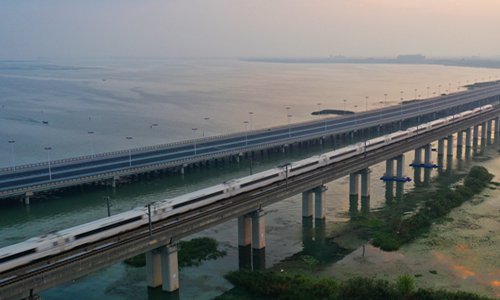HOME >> BUSINESS
Beijing-Shanghai high-speed railway outstrips industry
Source:Global Times Published: 2019/10/27 21:33:41

A bullet train passes by Suzhou, East China's Jiangsu Province, on September 28 Photo: IC
China's high-speed railway connecting Beijing and Shanghai saw revenue of 25 billion yuan ($3.5 billion) and net profits of 9.5 billion yuan, a net profit margin of 38 percent in the first three quarters of 2019, much above the general level of the national railway industry.
Beijing-Shanghai High-speed Railway Co, of which China Railway Group holds a controlling stake, on Tuesday submitted an application to China's stock regulator, the China Securities Regulatory Commission (CSRC) for a public listing.
According to the filing disclosed by the CSRC on Friday, the revenue of the company in 2018 stood at 31.2 billion yuan and net profit totaled 10.3 billion yuan, for a net profit margin of 32.9 percent. During 2018, the whole industry's net profit margin was less than 0.2 percent.
Beijing-Shanghai high-speed railway's profit margin is also higher than many listed companies, reaching a high level of a China's largest liquor maker, Wuliangye Yibin Co, according to media reports.
The most profitable high-speed railway of China was launched in June, 2011, and has seen a rapid growth in profits and rapid fall in debt ratio over the past several years.
The debt ratio of Beijing-Shanghai high-speed rail was 22.53 percent in 2016, and dropped to 15.67 percent in 2018.
As of the third quarter of 2019, the debt ratio had reduced to 14.62 percent.
According to the filing, the public offering shares of the Beijing-Shanghai high-speed rail are no more than 7.6 billion shares, accounting for no more than 15 percent of the total share capital after IPO.
The railway's operational mileage accounted for 1 percent of the national total operational mileage in 2018, and carried 192 million trips in the year, accounting for 5.7 percent of the national total railway travels, according to the filing.
The Beijing-Shanghai high-speed railway covers a length of 1,318 kilometers.
Posted in: COMPANIES